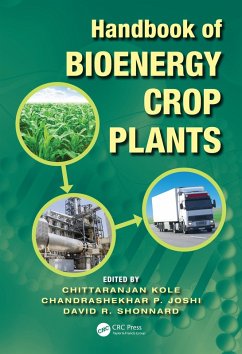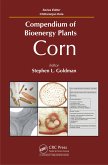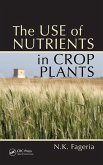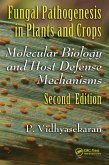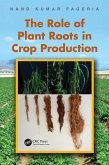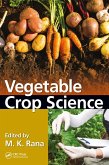Handbook of Bioenergy Crop Plants (eBook, PDF)
Redaktion: Kole, Chittaranjan; Shonnard, David R.; Joshi, Chandrashekhar P.
63,95 €
63,95 €
inkl. MwSt.
Sofort per Download lieferbar

32 °P sammeln
63,95 €
Als Download kaufen

63,95 €
inkl. MwSt.
Sofort per Download lieferbar

32 °P sammeln
Jetzt verschenken
Alle Infos zum eBook verschenken
63,95 €
inkl. MwSt.
Sofort per Download lieferbar
Alle Infos zum eBook verschenken

32 °P sammeln
Handbook of Bioenergy Crop Plants (eBook, PDF)
Redaktion: Kole, Chittaranjan; Shonnard, David R.; Joshi, Chandrashekhar P.
- Format: PDF
- Merkliste
- Auf die Merkliste
- Bewerten Bewerten
- Teilen
- Produkt teilen
- Produkterinnerung
- Produkterinnerung

Bitte loggen Sie sich zunächst in Ihr Kundenkonto ein oder registrieren Sie sich bei
bücher.de, um das eBook-Abo tolino select nutzen zu können.
Hier können Sie sich einloggen
Hier können Sie sich einloggen
Sie sind bereits eingeloggt. Klicken Sie auf 2. tolino select Abo, um fortzufahren.

Bitte loggen Sie sich zunächst in Ihr Kundenkonto ein oder registrieren Sie sich bei bücher.de, um das eBook-Abo tolino select nutzen zu können.
As the world's population is projected to reach 10 billion or more by 2100, devastating fossil fuel shortages loom in the future unless more renewable alternatives to energy are developed. Bioenergy, in the form of cellulosic biomass, starch, sugar, and oils from crop plants, has emerged as one of the cheaper, cleaner, and environmentally sustainab
- Geräte: PC
- mit Kopierschutz
- eBook Hilfe
- Größe: 15.55MB
Andere Kunden interessierten sich auch für
![Compendium of Bioenergy Plants (eBook, PDF) Compendium of Bioenergy Plants (eBook, PDF)]() Compendium of Bioenergy Plants (eBook, PDF)172,95 €
Compendium of Bioenergy Plants (eBook, PDF)172,95 €![Bioenergy Crops (eBook, PDF) Bioenergy Crops (eBook, PDF)]() Bioenergy Crops (eBook, PDF)52,95 €
Bioenergy Crops (eBook, PDF)52,95 €![The Use of Nutrients in Crop Plants (eBook, PDF) The Use of Nutrients in Crop Plants (eBook, PDF)]() Nand Kumar FageriaThe Use of Nutrients in Crop Plants (eBook, PDF)63,95 €
Nand Kumar FageriaThe Use of Nutrients in Crop Plants (eBook, PDF)63,95 €![Compendium of Bioenergy Plants (eBook, PDF) Compendium of Bioenergy Plants (eBook, PDF)]() Compendium of Bioenergy Plants (eBook, PDF)63,95 €
Compendium of Bioenergy Plants (eBook, PDF)63,95 €![Fungal Pathogenesis in Plants and Crops (eBook, PDF) Fungal Pathogenesis in Plants and Crops (eBook, PDF)]() P. VidhyasekaranFungal Pathogenesis in Plants and Crops (eBook, PDF)236,95 €
P. VidhyasekaranFungal Pathogenesis in Plants and Crops (eBook, PDF)236,95 €![The Role of Plant Roots in Crop Production (eBook, PDF) The Role of Plant Roots in Crop Production (eBook, PDF)]() Nand Kumar FageriaThe Role of Plant Roots in Crop Production (eBook, PDF)63,95 €
Nand Kumar FageriaThe Role of Plant Roots in Crop Production (eBook, PDF)63,95 €![Vegetable Crop Science (eBook, PDF) Vegetable Crop Science (eBook, PDF)]() Vegetable Crop Science (eBook, PDF)49,95 €
Vegetable Crop Science (eBook, PDF)49,95 €-
-
-
As the world's population is projected to reach 10 billion or more by 2100, devastating fossil fuel shortages loom in the future unless more renewable alternatives to energy are developed. Bioenergy, in the form of cellulosic biomass, starch, sugar, and oils from crop plants, has emerged as one of the cheaper, cleaner, and environmentally sustainab
Dieser Download kann aus rechtlichen Gründen nur mit Rechnungsadresse in A, B, BG, CY, CZ, D, DK, EW, E, FIN, F, GR, HR, H, IRL, I, LT, L, LR, M, NL, PL, P, R, S, SLO, SK ausgeliefert werden.
Produktdetails
- Produktdetails
- Verlag: Taylor & Francis eBooks
- Seitenzahl: 874
- Erscheinungstermin: 22. März 2012
- Englisch
- ISBN-13: 9781439816851
- Artikelnr.: 39486040
- Verlag: Taylor & Francis eBooks
- Seitenzahl: 874
- Erscheinungstermin: 22. März 2012
- Englisch
- ISBN-13: 9781439816851
- Artikelnr.: 39486040
- Herstellerkennzeichnung Die Herstellerinformationen sind derzeit nicht verfügbar.
Professor Chittaranjan Kole, Director of Research of the Institute of Nutraceutical Research at the Clemson University, is an internationally renowned scientist with over 27 years of experience in teaching and research on plant genetics, genomics, and biotechnology. He has guided 30 research students and published more than 140 research articles, most of which appeared in the leading peer-reviewed journals and proceedings of international meetings. Several of his pioneering contributions, particularly on molecular evolution of flowering time, stress-related and highly repetitive genes, have paved the way for several new avenues for fellow scientists. His scientific contributions and edited books have been appreciated by several leading scientists including seven Nobel Laureates. Professor Chandrashekhar Joshi is a plant molecular geneticist in the School of Forest Resources and Environmental Science (SFRES) at the Michigan Technological University. He has 30 years of research experience in plant molecular biology. His current research focuses on wood cell wall development in bioenergy trees, with particular emphasis on unraveling the process of cellulose synthesis for improved bioenergy production. He teaches courses in genomics, molecular genetics, bioinformatics, and grantsmanship. He has authored over 160 publications and presentations, four patents and two books. Professor David Shonnard has been on the faculty in the Department of Chemical Engineering at Michigan Technological Universitysince 1993. His current research interests focus on investigations of new forest-based biorefinery processes for production of transportation fuels (such as cellulosic ethanol) from woody biomass using recombinant DNA approaches. Another active research area is life-cycle assessment (LCA) of biofuels and other biorefinery products to determine greenhouse gas emissions and net energy balance
Section I. Conventional and Molecular Breeding for Improvement of Biofuel
Crops: Past, Present, and Future. Genomics for Bioenergy Production.
Genetic Engineering for Bioenergy Crops. In Planta Production of Cell Wall
Degrading Enzymes. From Plant Cell Walls to Biofuels-Arabidopsis thaliana
Model. Ecologically Sustainable Bioenergy Communities: Species Selection
and Habitat Considerations. Biomass Harvest and Logistics. Chemical
Engineering for Bioenergy Plants: Concepts and Strategies. International
Fuel Quality. Biofuel Use from Bioenergy Crops: Internal Combustion Engines
in Transportation. Life-Cycle Energy and Greenhouse Gas Impacts of Biofuels
and Biomass Electricity. Public Policies, Economics, Public Perceptions,
and the Future of Bioenergy Crops. Section II. Cassava. Jatropha. Forest
Trees. Maize. Oil Palm. Oilseed Brassicas. Sorghum. Soybean.Sugarcane.
Switchgrass. Section III. Brachypodium. Diesel Trees. Minor Seed Oils.
Lower Plants. Paulownia. Shrub Willow. Sugarbeet. Sunflower. Sweetpotato.
Organic Farm Waste and Municipal Sludge. Vegetable Oils. Index.
Crops: Past, Present, and Future. Genomics for Bioenergy Production.
Genetic Engineering for Bioenergy Crops. In Planta Production of Cell Wall
Degrading Enzymes. From Plant Cell Walls to Biofuels-Arabidopsis thaliana
Model. Ecologically Sustainable Bioenergy Communities: Species Selection
and Habitat Considerations. Biomass Harvest and Logistics. Chemical
Engineering for Bioenergy Plants: Concepts and Strategies. International
Fuel Quality. Biofuel Use from Bioenergy Crops: Internal Combustion Engines
in Transportation. Life-Cycle Energy and Greenhouse Gas Impacts of Biofuels
and Biomass Electricity. Public Policies, Economics, Public Perceptions,
and the Future of Bioenergy Crops. Section II. Cassava. Jatropha. Forest
Trees. Maize. Oil Palm. Oilseed Brassicas. Sorghum. Soybean.Sugarcane.
Switchgrass. Section III. Brachypodium. Diesel Trees. Minor Seed Oils.
Lower Plants. Paulownia. Shrub Willow. Sugarbeet. Sunflower. Sweetpotato.
Organic Farm Waste and Municipal Sludge. Vegetable Oils. Index.
Section I. Conventional and Molecular Breeding for Improvement of Biofuel
Crops: Past, Present, and Future. Genomics for Bioenergy Production.
Genetic Engineering for Bioenergy Crops. In Planta Production of Cell Wall
Degrading Enzymes. From Plant Cell Walls to Biofuels-Arabidopsis thaliana
Model. Ecologically Sustainable Bioenergy Communities: Species Selection
and Habitat Considerations. Biomass Harvest and Logistics. Chemical
Engineering for Bioenergy Plants: Concepts and Strategies. International
Fuel Quality. Biofuel Use from Bioenergy Crops: Internal Combustion Engines
in Transportation. Life-Cycle Energy and Greenhouse Gas Impacts of Biofuels
and Biomass Electricity. Public Policies, Economics, Public Perceptions,
and the Future of Bioenergy Crops. Section II. Cassava. Jatropha. Forest
Trees. Maize. Oil Palm. Oilseed Brassicas. Sorghum. Soybean.Sugarcane.
Switchgrass. Section III. Brachypodium. Diesel Trees. Minor Seed Oils.
Lower Plants. Paulownia. Shrub Willow. Sugarbeet. Sunflower. Sweetpotato.
Organic Farm Waste and Municipal Sludge. Vegetable Oils. Index.
Crops: Past, Present, and Future. Genomics for Bioenergy Production.
Genetic Engineering for Bioenergy Crops. In Planta Production of Cell Wall
Degrading Enzymes. From Plant Cell Walls to Biofuels-Arabidopsis thaliana
Model. Ecologically Sustainable Bioenergy Communities: Species Selection
and Habitat Considerations. Biomass Harvest and Logistics. Chemical
Engineering for Bioenergy Plants: Concepts and Strategies. International
Fuel Quality. Biofuel Use from Bioenergy Crops: Internal Combustion Engines
in Transportation. Life-Cycle Energy and Greenhouse Gas Impacts of Biofuels
and Biomass Electricity. Public Policies, Economics, Public Perceptions,
and the Future of Bioenergy Crops. Section II. Cassava. Jatropha. Forest
Trees. Maize. Oil Palm. Oilseed Brassicas. Sorghum. Soybean.Sugarcane.
Switchgrass. Section III. Brachypodium. Diesel Trees. Minor Seed Oils.
Lower Plants. Paulownia. Shrub Willow. Sugarbeet. Sunflower. Sweetpotato.
Organic Farm Waste and Municipal Sludge. Vegetable Oils. Index.
